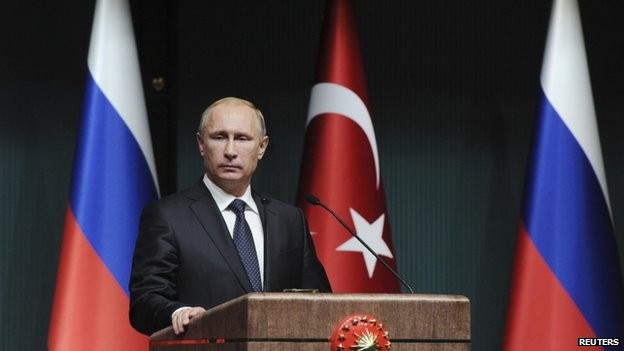(VOVworld) – Partners involved in the South Stream Gas Project are scheduled to meet in Belgium on December 9, 2 weeks after Russian President Vladimir Putin announced he was canceling this important gas project.
 |
| The Russian president said the South Stream pipeline could not go ahead without EU and Bulgarian support |
The South Stream Gas Project is a huge project by Russia’s Gazprom group to transport natural gas from Russia to the Black Sea and central and southern Europe, including Bulgaria, Serbia, Hungary, Greece, Slovenia, Croatia, and Austria. With a planned annual capacity of 63 billion cubic meters of gas, the pipeline will directly connect Russia and Europe without crossing Ukraine. On December 1, Putin announced he was canceling the project and starting a new pipeline across Turkey, a non-EU country.
Losses for many countries
Serbian Foreign Minister Ivica Dacic said Serbia will be greatly affected because it has no alternatives to the South Stream pipeline except a pipeline across Ukraine, which involves risks from the current conflict there. Serbia has already invested 30 million euros in the South Stream project. Austria has already built oil storage reserves. Bulgaria’s former Minister of Energy Rumen Ovcharov said Bulgaria could lose as much as 750 million USD a year because of the project’s cancellation. The Hungarian Foreign Minister said Hungary will have to seek alternative gas resources.
Energy groups will also be impacted. Italy’s Saipem energy group said it would lose 2 billion USD. EU companies have poured at least 2.5 billion USD into the project, and Gazprom has spent about 5 billion USD on construction in Russia.
In the long run a scrapped South Stream project will not only change the EU’s energy map but also affect Russia-EU relations and the EU’s internal affairs.
Political and financial considerations
Putin explained that the cancellation was because Bulgaria has not issued a construction permit for the project’s component on its territory. Russia said the European Commission put pressure on Bulgaria to withhold the permit because the project violates the EU’s competition rules and energy source diversification policy. But a deeper reason is that the EU wants to avoid any dependence on Russia while the two sides are imposing mutual economic sanctions.
Mounting costs is another reason. In 2007 Gazprom estimated the total cost at 10 billion USD. But that figure increased to 40 billion USD in 2014. Such a huge investment needs the support of the Russian government, but the Russian economy is in a difficult period due to western sanctions. If the pipeline is moved to Turkey, Gazprom will only need 10 billion USD.
Opportunities
Following Putin’s announcement, Gazprom said it will not return to the South Stream project because it’s not supported by EU leaders.
Bulgaria and Serbia have not received official notice from Russia and the Russian government has not discarded the intergovernmental agreement with project countries. Putin’s Press Secretary, Dmitry Peskov, has not mentioned the cancellation. So far only Italy’s Saipem contractor received a suspension notice - for the construction of the undersea part.
Dmitry Baranov, chief expert of Finam Management of Russia, said the South Stream Project could be revived if the EU changes its stance. EU Energy Union Vice President Maros Sefcovic said the EU will not cancel the meeting with partners of the South Stream project on December 9. Bulgaria said it backs the project and is sending Deputy Prime Minister Tomislav Donchev and Energy Minister Temenujka Petkov to the meeting in Brussels.